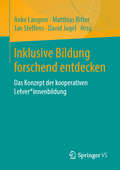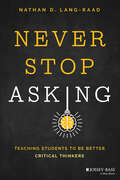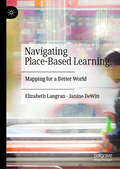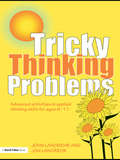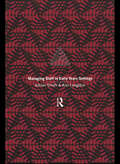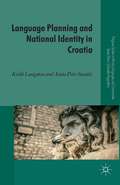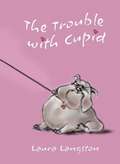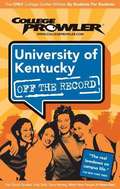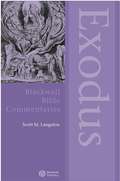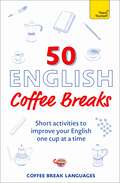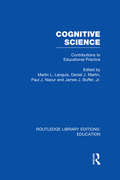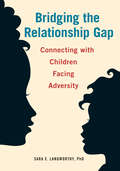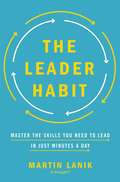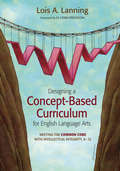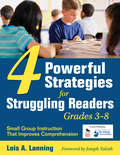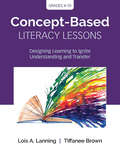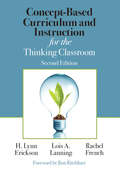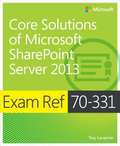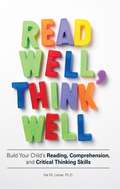- Table View
- List View
Inklusive Bildung forschend entdecken: Das Konzept der kooperativen Lehrer*innenbildung
by Anke Langner Matthias Ritter Jan Steffens David JugelDer Band beschreibt das Konzept der kooperativen Lehrer*innenbildung und zeigt die forschungsorientierte Entwicklung, Begleitung und Umsetzung inklusiven Unterrichts an Schulen. Dafür werden lern- und entwicklungspsychologische Grundlagen, didaktische und diagnostische Fragen, sowie die methodische und forschende Realisierung inklusiven Unterrichts vorgestellt und die zunehmende Kooperation zwischen Forschung, Lehre und Schule, als Möglichkeit zur Entwicklung einer inklusiven Bildung konzipiert.
Never Stop Asking: Teaching Students to be Better Critical Thinkers
by Nathan D. Lang-RaadThe modern K-12 teacher's must-have guide to teach students how to ask questions, weigh the evidence, and think critically and independently Students and teachers alike face a dilemma: Why think deeply when we can just take a shortcut by googling something? Why read an article when we can learn from a social media headline? If, as educators, we want to encourage our students to value thoughtfulness and to embrace the effort it takes to reach deep understandings, we must model that behavior ourselves. In Never Stop Asking, author Dr. Nathan Lang-Raad shows K-12 teachers how human brains like to take mental shortcuts, known as heuristics, that allow the brain to save energy and perform more efficiently. These heuristics, however, can lead to illogical thinking, cognitive biases, and fallacies that can hinder critical thinking. Never Stop Asking: Teaching Students to be Better Critical Thinkers is the armor we need to defend ourselves and our students against the all-too-tempting shortcuts that the digital age has to offer, employing strategies to consistently and explicitly support teaching critical thinking and weaving it into the everyday landscape of your classroom. Let’s ensure that the students of today will be the skilled thinkers of tomorrow. Learn about common psychological shortcuts and biases that hinder students and teachers alike Discover the logic and the science behind critical thinking and why it leads to better outcomes Gain strategies to bring critical thinking into the classroom and help students build patience, discipline, and skill Acknowledge and embrace the digital age in your teaching—without falling victim to its downsidesThis is an engaging and important book for K-12 teachers and instructional coaches. Teacher training programs can also be enhanced by the practical wisdom and easy-to-implement strategies inside.
Navigating Place-Based Learning: Mapping for a Better World
by Elizabeth Langran Janine DeWittThis book explores how educators can realize the potential of critical place-based pedagogy. The authors’ model leverages the power of technology through strategies such as mobile mapping so that students can read the world and share spatial narratives. The same complexity that makes spaces outside the classroom ideal for authentic, purposeful learning creates challenges for educators who must minimize students taking wrong turns or reaching dead ends. Instructional design process is key and the authors offer exemplars of this from multiple disciplines. Whether students are exploring a local community or a natural environment, place-based inquires must include recognition of privilege and the social dynamics that reinforce inequalities. Concluding with a discussion of the changing social context, the authors highlight how contemporary events add a sense of urgency to the call for a critical place-based pedagogy—one that is more inclusive for all students.
Learn to Think: Basic Exercises in the Core Thinking Skills for Ages 6-11
by John LangrehrClassroom questions have traditionally focussed on testing the recall, understanding and application of content and methods. Research suggests that pupils require activities that encourage them to think flexibly about possibilities and to make independent judgements about information. Learn to Think takes a cross-curriculum approach and offers a wide range of exercises in all significant thinking skills areas: Organisational Analytical Evaluative Creative Predicting, categorisation, ordering, generalising, problem solving, summarising, analysis, making distinctions, decision making, cause and evidence are among the skills developed. This book introduces the basic core thinking processes used to connect and make sense of information through a range of skill based sections which provide the basis of a thinking skills programme for pupils. It is complete with introductory notes and examples, pupil work sheets, suggested answers and further useful questions. The resources are fully photocopiable and are suitable for 6 -11 year olds.
Tricky Thinking Problems: Advanced Activities in Applied Thinking Skills for Ages 6-11
by John Langrehr Jan LangrehrClassroom questions have traditionally focussed on testing the recall, understanding and application of content and methods. Research suggests that pupils require activities that encourage them to think flexibly about possibilities and to make independent judgements about information. Tricky Thinking Problems explores the advancement of creative and critical thinking, and the activities are designed to help pupils test and develop such processes. A series of fascinating challenges are used to stimulate cognitive organisation in areas such as categories, similarities, differences, ordering, analysing, predicting and many more. Pupils will enjoy developing their range of different thinking skills as they complete the resources based on topics such as animals, weather, communications and food. Rather than being told which particular thinking skill to use, the questions are designed to encourage pupils to pick and choose a range of skills and apply them creatively. The resources are fully photocopiable and are suitable for 6 -11 year olds.
Managing Staff in Early Years Settings
by Ann Langston Adrian SmithThis book draws on a wide range of management theory and shows its relevance and relationship to early years settings. Case studies are used to provide the starting point for reflection, and throughout the chapters you are asked to consider the examples, stand back, interpret and audit your own actions in order to develop your management skills. This book will assist managers and prospective managers by providing them with the tools to facilitate staff training sessions or to conduct personal enquiry into the working of their own organization. Chapters cover: leadership and management teams and team building staff motivation managing change selecting suitable staff and effective interviewing staff assessment projecting and maintaining a positive image for your school or nursery managing conflict and stress.
Language Planning and National Identity in Croatia (Palgrave Studies in Minority Languages and Communities)
by K. Langston A. Peti-StanticFollowing the collapse of the former Yugoslavia, Croatian was declared to be a separate language, distinct from Serbian, and linguistic issues became highly politicized. This book examines the changing status and norms of the Croatian language and its relationship to Croatian national identity, focusing on the period after Croatian independence.
The Trouble with Cupid
by Laura LangstonWhen a dog food company announces a competition to find a talented dog for their ad campaign, experienced dog trainer Erin agrees to work with the school entry: a lazy, gluttonous bulldog named Cupid.
University of Kentucky (College Prowler)
by Mandy LangstonNo university affiliations. No half-truths. No out-of-touch authors who haven't been in school for decades. A class project turned company, College Prowler produces guidebooks that are written by actual college students and cover the things students really want to know. Unlike other guides that jam everything into a five-pound book and devote only two pages to each college, our single-school guidebooks give students only the schools they want and all the information they need. From academics and diversity to nightlife and sports, we let the students tell it how it is. In addition to editorial reviews and grades for 20 different topics, more than 80 percent of each guide is composed of actual student reviews of their school. Whether readers are looking for "Best and Worst" lists, "Did You Knows?" or traditions, College Prowler guides have it all. Our books are the only place for local slang, urban legends, and tips on the best places to find a date, study, or grab a bite to eat.
Exodus Through the Centuries (Wiley Blackwell Bible Commentaries #5)
by Scott M. LangstonThis bible commentary looks at how Exodus has influenced and has been influenced by history, religion, politics, the arts and other forms of culture over the ages. A bible commentary tracing the reception history of Exodus from Old Testament times, through the Patristic and Reformation periods, to the present day. Considers the ways in which Exodus has influenced and has been influenced by history, religion, politics, the arts and other forms of culture in Jewish, Christian and secular settings. Looks at how Exodus has served as a tool of liberation and tyranny in a variety of settings. Shows how Exodus has been used to shape the identities of individuals and groups. Discusses the works of current and past poets, musicians, film-makers, authors and artists influenced by Exodus. Addresses uses of Exodus related to American and European history such as the Glorious Revolution, colonialism, the American Revolution, Civil War, Civil Rights Movement, African-Americans, and Native Americans, as well as uses by prominent and little-known historical figures Considers the impact of the Ten Commandments and other laws, in legal, political and religious contexts. The Blackwell Bible Commentary series is supported by a website at www.bbibcomm.net
50 English Coffee Breaks: Short activities to improve your English one cup at a time (50 Coffee Breaks Series)
by Coffee Break LanguagesTransform your down time into 'do time'.The most successful language learners create a habit of studying a little bit, often. With 50 English Coffee Breaks, you can easily improve your English by combining it with your relaxing daily coffee - from a 5-minute espresso to a 15-minute latte.Organised by 5, 10 and 15 minutes, these 50 varied and lively activities - from anagrams and idiom challenges to recipes and quotations - are created for high-beginner to intermediate adult and young-adult learners. The activities are carefully designed to keep you motivated and build your skills in key areas.· Reading comprehension· Writing skills· Grammar confidence· Phrasal verbs practice · Vocabulary development· Cultural awarenessBy practising English in a fun and relaxed way - in the time you have - you will find time to achieve your language-learning goals. So, pick up your preferred drink and this practical book. Soon, studying English will be the most pleasant and productive part of your busy day.For 15 years Coffee Break Languages has helped millions of people to learn a language in a way that fits into their everyday life: while walking the dog, working out at the gym, or on their coffee break!Teach Yourself has collaborated with Coffee Break Languages to bring their brilliant method to a wider audience by producing their first-ever printed product. All the activities are written by long-time English teachers in Coffee Break's characteristically friendly and conversational style. It's the perfect complement to your studies.The activities are levelled for high-beginner to low-intermediate learners: CEFR A2-B1 and ACTFL Intermediate-low/mid
50 English Coffee Breaks: Short activities to improve your English one cup at a time (50 Coffee Breaks Series)
by Coffee Break LanguagesTransform your down time into 'do time'.The most successful language learners create a habit of studying a little bit, often. With 50 English Coffee Breaks, you can easily improve your English by combining it with your relaxing daily coffee - from a 5-minute espresso to a 15-minute latte.Organised by 5, 10 and 15 minutes, these 50 varied and lively activities - from anagrams and idiom challenges to recipes and quotations - are created for high-beginner to intermediate adult and young-adult learners. The activities are carefully designed to keep you motivated and build your skills in key areas.· Reading comprehension· Writing skills· Grammar confidence· Phrasal verbs practice · Vocabulary development· Cultural awarenessBy practising English in a fun and relaxed way - in the time you have - you will find time to achieve your language-learning goals. So, pick up your preferred drink and this practical book. Soon, studying English will be the most pleasant and productive part of your busy day.For 15 years Coffee Break Languages has helped millions of people to learn a language in a way that fits into their everyday life: while walking the dog, working out at the gym, or on their coffee break!Teach Yourself has collaborated with Coffee Break Languages to bring their brilliant method to a wider audience by producing their first-ever printed product. All the activities are written by long-time English teachers in Coffee Break's characteristically friendly and conversational style. It's the perfect complement to your studies.The activities are levelled for high-beginner to low-intermediate learners: CEFR A2-B1 and ACTFL Intermediate-low/mid
Cognitive Science: Contributions to Educational Practice (Routledge Library Editions: Education)
by Marlin L. Languis Daniel J. Martin Paul J. Naour James J. Buffer Jr.This volume brings together theory, research and development in cognitive neuro-science. It investigates the neural processes involved in cognition and learning, using developments in computer technology to study the brain in action and other topographic brain mapping. Electrical activity patterns of the brain in the learning processes are displayed through these techniques. Part 1 delineates neuroscience application to educational perspectives. Part 2 reports on emotional and learning disorders, such as autism, while Part 3 applies cognitive science to educational and mental health, as well as to settings such as the classroom, rehabilitation centre or doctor’s office.
Bridging the Relationship Gap
by Sara E. LangworthyRelationships play an important role in human development, especially in the first years of life. Bridging the Relationship Gap provides caregivers tools and encouragement to be the strong, positive, and nurturing adult these children need in order to thrive.Learn more about the factors that contribute to the achievement and relationship gap, including ecological, biological, and cultural differences. Most importantly, find many tools and resources to help you more effectively deal with the tough situations and become each child's strongest ally.Sara Langworthy, PhD, currently serves as policy coordinator for Extension Children, Youth, and Family Consortium at the University of Minnesota.
The Leader Habit: Master the Skills You Need to Lead--in Just Minutes a Day
by Martin LanikIn leadership as in life, only practice makes perfect. Habits are powerful. They can lock us into negative behaviors (like snacking and smoking) or train us to act automatically in ways that benefit us (such as putting on a seat belt). Routines quietly undergird large portions of what we do and how we function. Habit formation can speed success in the workplace as well—even in complex areas like leadership. The Leader Habit spotlights 22 essential leadership abilities, breaking them down into a series of small, learnable behaviors. The accompanying 5-minute exercises help you practice each of these new skills until they stick. Drawn from a study of hundreds of leaders across the globe, the book’s simple formula focuses on developing one skill at a time: sell the vision, delegate well, innovate often, empower others, overcome resistance, build strategic relationships, focus on customers, listen actively, negotiate effectively, and more. Many of us aspire to great leadership . . . consuming books and training. But unless you intentionally reinforce the right behaviors, results are fleeting. This eye-opening and original book builds the “muscle memory” to turn leadership skills into lasting habits.
Designing a Concept-Based Curriculum for English Language Arts: Meeting the Common Core With Intellectual Integrity, K–12
by Lois A. LanningHow to ensure your ELA teaching sticks How can you teach for understanding and meet Common Core standards at the same time? The answer: with a concept-based curriculum. Fusing Lynn Erickson's groundbreaking curriculum model with implementation guidelines and sample units, this book puts you on the fast track to using concept-based curriculum in your school or district. Lanning shows you how to design a curriculum that: Functions as a framework for lesson plans Unites the efforts of ELA teachers district-wide Addresses core standards while focusing on student understanding Creates a ripple effect helping to align curriculum, assessments, and instruction
Four Powerful Strategies for Struggling Readers, Grades 3-8: Small Group Instruction That Improves Comprehension
by Lois A. LanningHelp struggling readers succeed by teaching four research-based comprehension strategies with sample lessons and a gradual-release approach leading to student-directed learning.
Concept-Based Literacy Lessons: Designing Learning to Ignite Understanding and Transfer, Grades 4-10 (Corwin Teaching Essentials)
by Lois A. Lanning Tiffanee BrownLiteracy is not a decontextualized drill of skills or learning just about "a book." You will highlight, ponder, and tab as you read about the design of Concept-Based literacy lessons. All students deserve the best literacy instruction—and this IS the BEST. —H. Lynn Erickson The guide for designing and implementing Concept-Based literacy lessons A Concept-Based Curriculum is designed to help students uncover important, transferable understandings about what it means to be a capable reader, writer, speaker, viewer, listener, and thinker. But, too often, a well-designed, conceptual curriculum does not translate into conceptual teaching. Concept Based Literacy Lessons helps bridge that divide, and provides practical support for teachers implementing Concept-Based literacy lessons. This essential guide picks up where the book, Designing Concept-Based Curriculum for English Language Arts left off. Authors Lois Lanning and Tiffanee Brown explain how to move from design to actionable practice by providing tools and examples straight from the classroom. They’ll also show teachers how to use common literacy instructional practices (such as Socratic Seminar, close reading, think aloud, explicit instruction, and so forth) to support students′ transfer of conceptual understanding. Written especially for literacy teachers, readers will find Step-by-step help with lesson planning for conceptual understanding and transfer Ideas for supporting inductive learning Classroom Snapshots that showcase familiar literacy practices in Concept-Based classrooms Strategies to promote critical, reflective, and conceptual thinking Model elementary and secondary Concept-Based lesson and unit plans A chapter devoted to answering frequently asked questions For educators looking for practical ways to implement a Curriculum and Instruction Model that’s more inquiry-driven and idea-centered, look no further than this book.
Concept-Based Literacy Lessons: Designing Learning to Ignite Understanding and Transfer, Grades 4-10 (Corwin Teaching Essentials)
by Lois A. Lanning Tiffanee BrownLiteracy is not a decontextualized drill of skills or learning just about "a book." You will highlight, ponder, and tab as you read about the design of Concept-Based literacy lessons. All students deserve the best literacy instruction—and this IS the BEST. —H. Lynn Erickson The guide for designing and implementing Concept-Based literacy lessons A Concept-Based Curriculum is designed to help students uncover important, transferable understandings about what it means to be a capable reader, writer, speaker, viewer, listener, and thinker. But, too often, a well-designed, conceptual curriculum does not translate into conceptual teaching. Concept Based Literacy Lessons helps bridge that divide, and provides practical support for teachers implementing Concept-Based literacy lessons. This essential guide picks up where the book, Designing Concept-Based Curriculum for English Language Arts left off. Authors Lois Lanning and Tiffanee Brown explain how to move from design to actionable practice by providing tools and examples straight from the classroom. They’ll also show teachers how to use common literacy instructional practices (such as Socratic Seminar, close reading, think aloud, explicit instruction, and so forth) to support students′ transfer of conceptual understanding. Written especially for literacy teachers, readers will find Step-by-step help with lesson planning for conceptual understanding and transfer Ideas for supporting inductive learning Classroom Snapshots that showcase familiar literacy practices in Concept-Based classrooms Strategies to promote critical, reflective, and conceptual thinking Model elementary and secondary Concept-Based lesson and unit plans A chapter devoted to answering frequently asked questions For educators looking for practical ways to implement a Curriculum and Instruction Model that’s more inquiry-driven and idea-centered, look no further than this book.
Concept-Based Curriculum and Instruction for the Thinking Classroom: A Multimedia Kit For Professional Development (Corwin Teaching Essentials)
by Lois A. Lanning H. Lynn Erickson Rachel FrenchDevelop students’ critical thinking, abstract reasoning, and creative learning skills with concept-based teaching! Take learning beyond the facts with a teaching approach that develops conceptual thinking and problem-solving skills. A Concept-Based curriculum recaptures students’ innate curiosity about the world and provides the thrilling feeling of using one’s mind well. Concept-Based teachers will learn how to: Meet the demands of rigorous academic standards Use the Structure of Knowledge and Process when designing disciplinary units Engage students in inquiry through inductive teaching Identify conceptual lenses and craft quality generalizations
Concept-Based Curriculum and Instruction for the Thinking Classroom: A Multimedia Kit For Professional Development (Corwin Teaching Essentials)
by Lois A. Lanning H. Lynn Erickson Rachel FrenchDevelop students’ critical thinking, abstract reasoning, and creative learning skills with concept-based teaching! Take learning beyond the facts with a teaching approach that develops conceptual thinking and problem-solving skills. A Concept-Based curriculum recaptures students’ innate curiosity about the world and provides the thrilling feeling of using one’s mind well. Concept-Based teachers will learn how to: Meet the demands of rigorous academic standards Use the Structure of Knowledge and Process when designing disciplinary units Engage students in inquiry through inductive teaching Identify conceptual lenses and craft quality generalizations
Exam Ref 70-331: Core Solutions of Microsoft SharePoint Server 2013
by Troy LanphierPrepare for Exam 70-331--and help demonstrate your real-world mastery of Microsoft SharePoint Server 2013 core solutions. Designed for experienced IT professionals ready to advance their status, Exam Ref focuses on the critical-thinking and decision-making acumen needed for success at the MCSE level. Focus on the expertise measured by these objectives: Design a SharePoint Topology Plan Security Install and Configure SharePoint Farms Create and Configure Web Applications and Site Collections Maintain a Core SharePoint Environment This Microsoft Exam Ref: Organizes its coverage by exam objectives. Features strategic, what-if scenarios to challenge you. Includes a 15% exam discount from Microsoft. Offer expires 12/31/2017.
Read Well, Think Well
by Hal W LanseMillions of children struggle with reading-and even more struggle to understand exactly what they're reading. Read Well, Think Well will help you to teach your children to build the essential reading and comprehension skills they need to succeed in today's demanding school system. Teacher trainer and literacy specialist Hal W. Lanse, Ph.D., provides the necessary knowledge, strategies, and exercises that will turn your kids into first-rate readers and thinkers. Learn how to:Choose the best, age-appropriate reading materialBoost your child's memory and retention skills through verbal and visual exercisesUtilize technology aids to help your child understand the comprehension processUnderstand the "Big Six" of reading comprehension through analysis and summary of the textPromote values for everyday life through readingRead Well, Think Well-the ultimate guide to secure your child's academic success.Hal W. Lanse, Ph.D., is a premiere teacher trainer in New York City, specializing in middle-grade and young-adult literacy. He is the winner of the 1997 Frank W. Dilley Award, Walden University's annual prize for outstanding doctoral dissertation. Dr. Lanse, a consultant with the UFT Teacher Center, trains teachers in current literacy research and shows them how to turn the research into daily classroom practice. He has also taught many parent workshops for the United Federation of Teachers. Lanse lives with his teenage son, Kenny, in New York, NY.
Read Well, Think Well: Build Your Child's Reading, Comprehension, and Critical Thinking Skills
by Hal W LanseMillions of children struggle with reading-and even more struggle to understand exactly what they're reading. Read Well, Think Well will help you to teach your children to build the essential reading and comprehension skills they need to succeed in today's demanding school system. Teacher trainer and literacy specialist Hal W. Lanse, Ph.D., provides the necessary knowledge, strategies, and exercises that will turn your kids into first-rate readers and thinkers. Learn how to:Choose the best, age-appropriate reading materialBoost your child's memory and retention skills through verbal and visual exercisesUtilize technology aids to help your child understand the comprehension processUnderstand the "Big Six" of reading comprehension through analysis and summary of the textPromote values for everyday life through readingRead Well, Think Well-the ultimate guide to secure your child's academic success.Hal W. Lanse, Ph.D., is a premiere teacher trainer in New York City, specializing in middle-grade and young-adult literacy. He is the winner of the 1997 Frank W. Dilley Award, Walden University's annual prize for outstanding doctoral dissertation. Dr. Lanse, a consultant with the UFT Teacher Center, trains teachers in current literacy research and shows them how to turn the research into daily classroom practice. He has also taught many parent workshops for the United Federation of Teachers. Lanse lives with his teenage son, Kenny, in New York, NY.
Read Well, Think Well
by Hal W. LanseMillions of children struggle with reading-and even more struggle to understand exactlywhatthey're reading. Read Well, Think Wellwill help you to teach your children to build the essential reading and comprehension skills they need to succeed in today's demanding school system. Teacher trainer and literacy specialist Hal W. Lanse, Ph. D. , provides the necessary knowledge, strategies, and exercises that will turn your kids into first-rate readers and thinkers. Learn how to: Choose the best, age-appropriate reading material Boost your child's memory and retention skills through verbal and visual exercises Utilize technology aids to help your child understand the comprehension process Understand the "Big Six" of reading comprehension through analysis and summary of the text Promote values for everyday life through reading Read Well, Think Well-the ultimate guide to secure your child's academic success. Hal W. Lanse, Ph. D. , is a premiere teacher trainer in New York City, specializing in middle-grade and young-adult literacy. He is the winner of the 1997 Frank W. Dilley Award, Walden University's annual prize for outstanding doctoral dissertation. Dr. Lanse, a consultant with the UFT Teacher Center, trains teachers in current literacy research and shows them how to turn the research into daily classroom practice. He has also taught many parent workshops for the United Federation of Teachers. Lanse lives with his teenage son, Kenny, in New York, NY.
